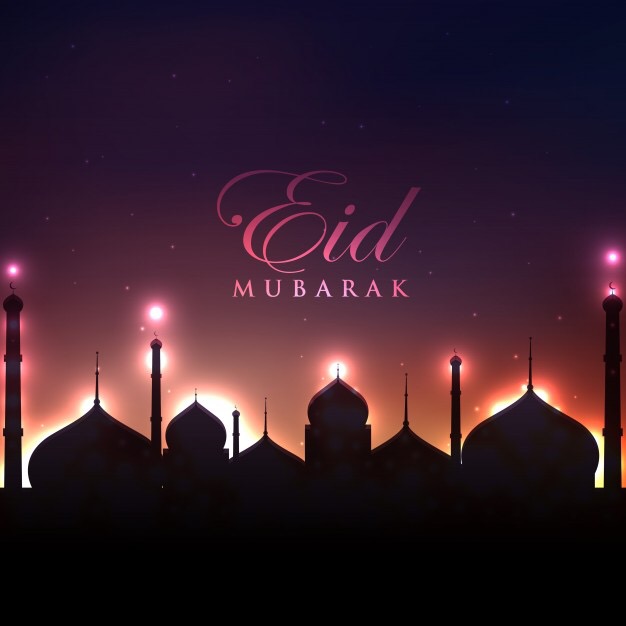The Messenger of Allah ﷺ taught us to fill these blessed days and nights with the remembrance of Allah generally and specifically with the takbir in which we express Allah’s greatness and transcendence. He said ﷺ: “Beautify your Eid days with the takbir.”[1] It is recommended to make the takbir after every prayer (fard or nafl) from Fajr on the Day of `Arafah (9th Dhu’l-Hijjah) until `Asr on the 13th, the final day of the three Days of Tashriq.
We should also fill the night before Eid with takbir from Maghrib up until the Eid prayer. On the night of Eid only, the takbir is not limited to being read after the prayer, but rather it should be read in abundance in our houses and mosques and in the streets (without causing disturbance). We should read it with our hearts filled with the greatness of Allah so that we are not merely repeating words without experiencing their meaning.
It is a sunnah to give life to the night before Eid, meaning spending whatever time we are able in worship and remembrance such that the night comes alive. The least we should do is to pray Maghrib, Isha and Fajr in congregation. The mosques of Tarim fill in the the second half of the night with people reading the Qur’an in groups, praying and making takbir together at intervals. At the end of the night everyone comes together for a khatam and dua.
It is mentioned in the hadith that if someone gives life to the nights before the two Eids, Allah will give life to his heart on the day when hearts die.[2] What is primarily meant is safety on the Day of Judgement but even in this life the majority of people’s hearts are dead, starved of the remembrance of Allah and heedless of the return to Him. Remembering Allah on nights such as these, however, when most people are busy with other things, will give life and tranquillity to our hearts.
There are different forms of the takbir. Here is one of them:
اللهُ أَكبرُ اللهُ أَكبرُ اللهُ أَكبر , لا إله إلا الله , الله أكبر الله أكبر ولِلَّهِ الحَمْد
اللهُ أَكبرُ اللهُ أَكبرُ اللهُ أَكبر , لا إله إلا الله , الله أكبر الله أكبر ولِلَّهِ الحَمْد
اللهُ أَكبرُ اللهُ أَكبرُ اللهُ أَكبر , لا إله إلا الله , الله أكبر الله أكبر ولِلَّهِ الحَمْد
الله أكبرُ كَبيرا والحمدُ لله كثيرا وسُبْحانَ اللهِ بُكْرَةً وأَصيلاَ .
لا إله إلا الله لا نَعْبُدُ إلا إِيَّاهُ مُخْلِصِين لَهُ الدِّينَ وَلَوْ كَرِهَ الكافِرون
لا إله إلا الله وَحْدَه صَدَقَ وَعْدَه ونَصَرَ عَبْدَه وأَعَزَّ جُنْدَه وهَزَمَ الأَحْزَابَ وَحْدَه
لا إله إلا الله واللهُ أكبرْ ولِلَّهِ الحَمْد
Allahu akbar, Allahu akbar, Allahu akbar la ilaha ill’Allah. Allahu akbar, Allahu akbar wa lillahi al-hamd
Allahu akbar, Allahu akbar, Allahu akbar la ilaha ill’Allah. Allahu akbar, Allahu akbar wa lillahi al-hamd
Allahu akbar, Allahu akbar, Allahu akbar la ilaha ill’Allah. Allahu akbar, Allahu akbar wa lillahi al-hamd
Allahu akbar kabira w’al-hamdulillahi kathira wa subhanallahi bukratan wa asila
La ilaha ill’Allahu la na`budu illa iyyahu mukhlisina lahu’ddina wa law kariha’l-kafirun
La ilaha ill’Allahu wahdahu sadaqa wa`dahu wa nasara `abdahu wa a`zza jundahu wa hazam al-ahzaba wahdah
La ilaha ill’Allahu w’Allahu akbar wa lillahi’l-hamd
[“Allah is most great. There is no deity save Him, all praise belongs to Him.
There is no deity save Him and we worship none but Him in complete sincerity even if the disbelievers dislike it.
There is no deity save Him alone. He fulfilled His promise, gave victory to His slave, made mighty His forces and He alone destroyed the Confederates. Allah is most great, there is no deity save Him, all praise belongs to Him.”]
The scholars say that whenever it is recommended to remember Allah it is also recommended to mention His Messenger ﷺ. Had it not been for him there would be no `Arafat or Eid or takbir. For this reason we should add, in honour of our Messenger, his Companions, wives and progeny:
اللهُمَّ صلِّ على سَيِّدِنا مُحمد
وعلى آلِ سَيِّدِنا مُحمد
وعلى أَصْحابِ سَيِّدِنا مُحمد
وعلى أَنْصَارِ سَيِّدِنا مُحمد
وعلى أَزْواجِ سَيِّدِنا مُحمد
وعلى ذُرِّيِّةِ سَيِّدِنا مُحمد
وسلِّمْ تَسْليماً كثيراً
Allahumma salli `ala sayyidina Muhammad
Wa `ala ali sayyidina Muhammad
Wa `ala ashabi sayyidina Muhammad
Wa `ala ansari sayyidina Muhammad
Wa `ala azwaji sayyidina Muhammad
Wa `ala dhurriyati sayyidina Muhammad
Wa sallim tasliman kathiran
Eid al-Adha
The root meaning of the word Eid is to return because it returns again and again, bringing with it Allah’s gifts and blessings. Allah ordered His Messenger ﷺ to show his gratitude to Him for the immense good that he was given (al-Kawthar) through prayer and slaughter: So pray to your Lord and slaughter.[3] The scholars say that this refers to the Eid Prayer and the sacrifice.
We should do what we are able to implement the other sunnahs of the Eid. Among them are taking a bath whether or not one is attending the Eid prayer and wearing one’s best clothes and best perfume. The Messenger of Allah ﷺ had special garments that he would only wear on Eid. He would not eat or drink anything until after the Eid prayer and the first thing he ate was liver from the animal he had sacrificed. It is recommended to walk to the prayer, taking a longer route on the way there and returning by a different shorter route. One should shake hands with one’s brethren and congratulate them on the Eid. One should be especially generous to one’s family, display one’s happiness on the occasion and try to visit one’s relatives and friends.
[1] Narrated by al-Tabarani
[2] Narrated by Ibn Majah
[3] Al-Kawthar, 118:2


